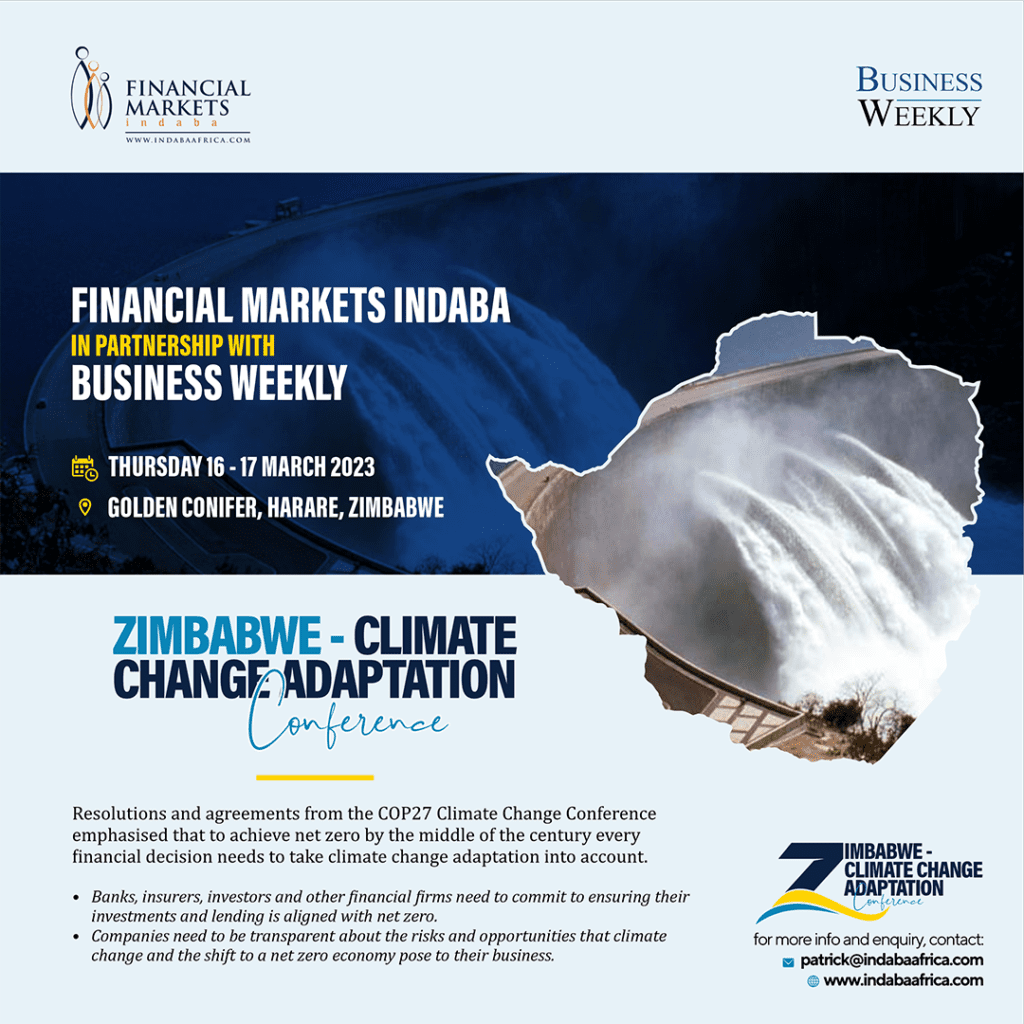CLIMATE ADAPTATION

ZIMBABWE - CLIMATE CHANGE ADAPTATION
Financial Markets Indaba seeks to highlight the nexus between climate change and development, and to emphasise that planning forward requires a development approach that is green, sustainable and climate resilient. Increasing temperatures and sea levels, changing precipitation patterns and more extreme weather are threatening human health and safety, food and water security and socio-economic development in Africa. Climate change threatens human health, food and water security and socio-economic development. Given the scale of climate change, and the fact that it will affect many areas of life, adaptation also needs to take place on a greater scale. Our economies and societies as a whole need to become more resilient to climate impacts and this will require large-scale efforts.
While the case for adaptation is clear, some communities most vulnerable to climate change are the least able to adapt because they are poor and/or in developing countries already struggling to come up with enough resources for basics like health care and education. The UNDP is helping countries to translate their adaptation commitments into measurable impact on the ground, by identifying action entry points and costed options; identifying investment opportunities; supporting concrete planning; enhancing cooperation with partners; and helping secure adaptation finance. The Conference of the Parties to the United Nations Framework Convention on Climate Change (COP27), that took place in the Egyptian coastal city of Sharm el-Sheikh, concluded with a historic decision to establish and operationalize a loss and damage fund. Developing countries have been seeking financial assistance for loss and damage which is money needed to rescue and rebuild the physical and social infrastructure of countries devastated by extreme weather.
Zimbabwe has a significant role to play in meeting climate mitigation objectives. For the government, strong climate action offers many co-benefits in addition to delivering less carbon-intensive economies. Different regions and communities suffer from different impacts and so effective adaptation strategies need to be contextualized to local needs and conditions. As countries seek to address the challenges of a warming planet, it’s crucial that local voices are heard, and that communities and local governments on-the-ground are at the forefront.
CLIMATE CHANGE ADAPTATION CONFERENCE MAIN PANEL DISCUSSION POINTS
WATER SECURITY – Global water demand is projected to increase by 55 per cent by 2050, by which time the world’s population will have surpassed nine billion. The increase in water use will come mainly from manufacturing, thermal electricity production and domestic use. Having a clear strategy and commitment on water is essential to deliver the 2030 Agenda for Sustainable Development. Ninety per cent of disasters or manifestations of climate change are related to water, such as floods, storms and droughts. Water is an imperative for disaster risk reduction, resilience-building and risk management.
- Water security – Impact of climate change
- The economic impact of the increase in water demands.
- Sustainable management of water
AGRICULTURE – A combination of smart farming and the use of food technology is required to boost the agricultural output in order to meet the ever-increasing global demand for food. Climate-smart agriculture investments provide financial, community and environmental returns over both short-term and long-term horizons and deliver long-term positive impact. Investors, companies and farmers face evolving climate-related risks to production and stability of supply chains and have to transform to resilient global food systems.
- Zimbabwe’s agricultural renaissance
- Adapting Agriculture and Food Security to Climate Change
- Investment in smart agricultural technology
MINING – In order to realize a lower-carbon future there will be a substantial increase in demand for several key minerals and metals to manufacture cleaner energy technologies. The production of minerals, such as graphite, lithium and cobalt, could increase by nearly 500% by 2050, to meet the growing demand for clean energy technologies. Clean energy transition will be significantly mineral intensive and the increasing demand for minerals and metals provides economic opportunities for resource-rich developing countries and private sector entities
- Zimbabwe’s approach to responsible mining and ESG
- Electric vehicles, technology, battery storage and renewable energy – Zimbabwe’s mineral resources potential: Lithium, Graphite
- Financing Zimbabwe’s mining sector – Investment partnerships with the international community to support economic growth.
ENERGY – The energy sector remains an important sector of investment. Adjusting to the need for climate-resilient development will mean integrating actions and responses to the physical, social, and economic impacts of climate change into all aspects of development planning and investment. Greater resilience to climate change impacts will be essential to the technical viability of the energy sector and its ability to cost-effectively meet the rising energy demands driven by economic and population growth
- Accelerating the energy transition – policies to deliver a rapid and efficient decarbonization of the energy sector
- Addressing energy challenges – manufacturing, importing, and use of energy-efficient appliances, lighting and equipment
- Energy sector – financing climate change adaptation
Policy Development – While much adaptation activity occurs at the local level, national governments play a vital role in overseeing, mandating and allocating resources to local adaptation activities. Many countries now have legislative and policy frameworks to govern adaptation. This includes many framework laws and policies that mainly set priorities on adaptation action. Framework laws and policies often include adaptation plans, information generation, regulation, and early warning systems. Climate risk information is foundational to effective adaptation planning and a priority for the majority of countries. But the more complex solutions, such as investing in the physical and social infrastructure that is required to adapt to climate change, are largely missing and the apparent gaps in adaptation laws and policies are adaptation investment and economic incentives to encourage adaptation. A significant majority of countries have enacted laws and policies to address climate change adaptation. While many identify floods and droughts as major hazards, other threats remain under-addressed.
Main themes of the panel discussion:
- Preparing for climate change: National Adaptation Programme – actions that government and related organisations will take to adapt to the challenges of climate change
- What are the climate change mitigation tools and research being used to help inform understanding and decision making on climate change risk.
- Operational guidance for civil society, developmental partners and donors – identifying practical ways to support Government in their efforts to reduce their vulnerability to climate variability and climate change.
Societal Response to Climate Change – The effects of climate change will be economic, social, and environmental and will alter people’s lives in a myriad of ways that we are just beginning to understand. Scholars have often argued that climatic changes plunge communities into crisis and provide the conditions that lead societies to collapse. Research indicates that if global energy use continues to grow as it has done historically, society would have to up its decarbonization efforts from its historic (160 year) value of 0.6% per year to 13% per year. A plausible range of decisions and actions by humans can determine the scale of the economic impacts. In order to avoid dangerous climate change, society will have to become much more responsive to the risks and damages that growth in global greenhouse gas emissions impose which include:
- Small farmers will feel the effects
- Rural and urban poor are the hardest hit
- Unequal capacity for adaptation
- Women, children, and the elderly will become even more vulnerable
- Communities will be forced to relocate
Potentially large economic impacts of climate change can be avoided by human actions. These actions include reductions of greenhouse gas emissions and improvement of socioeconomic conditions.
Date – Thursday 16 March 2023
Venue – Golden Conifer, Harare, Zimbabwe
Email – patrick@indabaafrica.com

